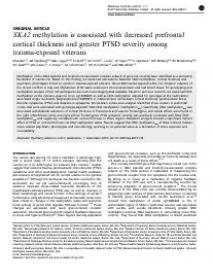SKA2 methylation is associated with decreased prefrontal cortical thickness and greater PTSD severity among trauma-exposed veterans
Methylation of the SKA2 (spindle and kinetochore-associated complex subunit 2) gene has recently been identified as a promising biomarker of suicide risk. Based on this finding, we examined associations between SKA2 methylation, cortical thickness and psychiatric phenotypes linked to suicide in trauma-exposed veterans. About 200 trauma-exposed white non-Hispanic veterans of the recent conflicts in Iraq and Afghanistan (91% male) underwent clinical assessment and had blood drawn for genotyping and methylation analysis. Of all, 145 participants also had neuroimaging data available. Based on previous research, we examined DNA methylation at the cytosine–guanine locus cg13989295 as well as DNA methylation adjusted for genotype at the methylation-associated single nucleotide polymorphism (rs7208505) in relationship to whole-brain cortical thickness, posttraumatic stress disorder symptoms (PTSD) and depression symptoms. Whole-brain vertex-wise analyses identified three clusters in prefrontal cortex that were associated with genotype-adjusted SKA2 DNA methylation (methylationadj). Specifically, DNA methylationadj was associated with bilateral reductions of cortical thickness in frontal pole and superior frontal gyrus, and similar effects were found in the right orbitofrontal cortex and right inferior frontal gyrus. PTSD symptom severity was positively correlated with SKA2 DNA methylationadj and negatively correlated with cortical thickness in these regions. Mediation analyses showed a significant indirect effect of PTSD on cortical thickness via SKA2 methylation status. Results suggest that DNA methylationadj of SKA2 in blood indexes stress-related psychiatric phenotypes and neurobiology, pointing to its potential value as a biomarker of stress exposure and susceptibility.
Geachte bezoeker,
De informatie die u nu opvraagt, kan door psychotraumanet niet aan u worden getoond. Dit kan verschillende redenen hebben,
waarvan (bescherming van het) auteursrecht de meeste voorkomende is. Wanneer het mogelijk is om u door te verwijzen naar de bron
van deze informatie, dan ziet u hier onder een link naar die plek.
Als er geen link staat, kunt u contact opnemen met de bibliotheek,
die u verder op weg kan helpen.
Met vriendelijke groet,
Het psychotraumanet-team.
Reference:
N. Sadeh, J.M. Spielberg, M.W. Logue, E.J. Wolf, A.K. Smith, J. Lusk, J.P. Hayes, E. Sperbeck, W.P. Milberg, R.E. McGlinchey, D.H. Salat, W.C. Carter, A. Stone, S.A. Schichman, D.E. Humphries, & M.W. Miller | 2015
In: Molecular psychiatry, ISSN 1359-4184 | september | 1-7
http://www.nature.com/mp/journal/vaop/ncurrent/full/mp2015134a.html
In: Molecular psychiatry, ISSN 1359-4184 | september | 1-7
http://www.nature.com/mp/journal/vaop/ncurrent/full/mp2015134a.html


